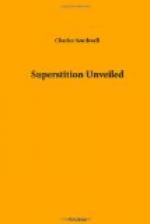According to this argument, nothing exists which has not solidity and extension, and nothing is extended and solid but matter, which in one state forms a crystal, in another a blade of grass, in a third a butterfly, and in other states other forms. The essence of grass, or the essence of crystal, in other words, those native energies of their several forms constituting and keeping them what they are, can no more be explained than can the essentiality of human nature.
But the Universalist, because he finds it impossible to explain the action of matter, because unable to state why it exhibits such vast and various energies as it is seen to exhibit, is none the less assured it naturally and therefore necessarily acts thus energetically. No Universalist pretends to understand how bread nourishes his frame, but of the fact that bread does nourish it he is well assured. He understands not how or why two beings should, by conjunction, give vitality to a third being more or less analogous to themselves, but the fact stares him in the face.
Our ‘sophists in surplices,’ who can no otherwise bolster up their supernatural system than by outraging all such rules of philosophising as forbid us to choose the greater of two difficulties, or to multiply causes without necessity, are precisely the men to explain everything. But unfortunately their explanations do, for the most part, stand more in need of explanation than the thing explained. Thus, they explain the origin of matter by reference to an occult, immense, and immensely mysterious phantasm without body, parts or passions, who sees though not to be seen, hears though not to be heard, feels though not to be felt, moves though not to be moved, knows though not to be known, and, in short, does everything, though not to be done by anything. Well might Godwin say the rage of accounting for what is obviously unaccountable, so common among philosophers of this stamp, has brought philosophy itself into discredit.
There is an argument against the notion of a Supernatural Causer which the author does not remember to have met with, but which he considers an argument of great force—it is this. Cause means change, and as there manifestly could not be change before there was anything to change, to conceive the universe caused is impossible.
That the sense here attached to the word cause is not a novel one every reader knows who has seen an elaborate and ably written article by Mr. G.H. Lewes, on ‘Spinoza’s Life and Works,’ where effect is defined as cause realised; the natura naturans conceived as natura naturata; and cause or causation is define as simply change. When, says Mr. Lewes, the change is completed, we name the result effect. It is only a matter of naming.




